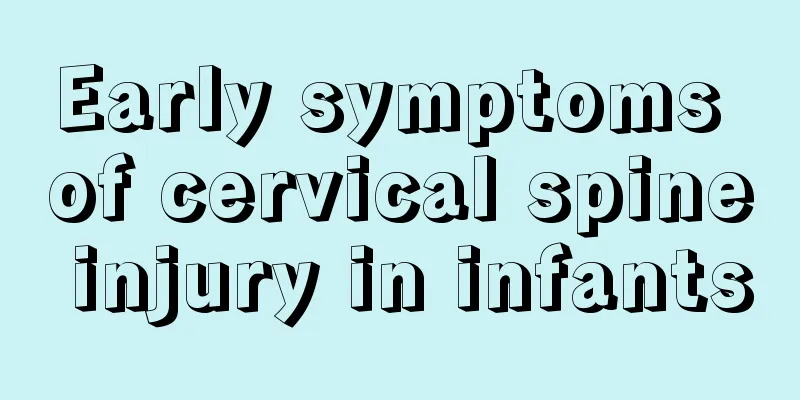What anti-inflammatory drugs do children take?

|
The cold winter weather is quite cold. Even if you wear thick cotton clothes and thick boots, you still can't resist the cold wind. Many children like to run and jump, and their bodies are prone to sweating. When they take off their clothes, they will be caught in the wind. At this time, children's colds will cause upper respiratory tract infections and many inflammatory diseases. But if you want to treat it, what are the anti-inflammatory drugs for children? Commonly used ones are: amoxicillin granules and azithromycin granules. 1. Acute upper respiratory tract infection, pharyngitis, tonsillitis, laryngitis in children Upper respiratory tract infection refers to the general term for acute inflammation caused by pathogens invading the nasal cavity, pharynx or throat. It is the most common infectious disease of the respiratory tract. Local symptoms are obvious, including congestion, edema, secretions of the nasal mucosa, and mild congestion of the pharynx. In the early stage, there will be dryness, itching or burning sensation in the throat. At the same time or several hours after the onset, there may be sneezing, nasal congestion, and watery nasal discharge, which will thicken after 2 to 3 days. It may be accompanied by sore throat, and sometimes hearing loss due to Eustachian tube inflammation. It may also cause tearing, dull taste, shortness of breath, hoarseness, and a small amount of coughing. Acute infectious laryngitis is an acute diffuse inflammation of the larynx with wax. The clinical features are barking cough, hoarseness, laryngeal striae, and inspiratory dyspnea. The above-mentioned diseases are common clinical diseases. It is generally recommended to use amoxicillin granules for mild cases and azithromycin granules for severe cases. There is no need to use newer and more advanced antibiotics. 2. Acute bronchitis in children Acute bronchitis is an acute inflammation of the bronchial mucosa. Common causes are viral or bacterial infection, physical or chemical stimulation or allergic reaction. The disease often occurs secondary to acute upper respiratory tract infection. The onset of the disease often includes symptoms of upper respiratory tract infection such as nasal congestion, sneezing, sore throat, and hoarseness. Most systemic symptoms are mild, with only mild chills, fever, headache and body aches. Infants and young children may have symptoms such as fever, vomiting and diarrhea. The cough is mild at first, irritating, and produces little sputum. After 1 to 2 days, the cough worsens and the sputum changes from mucus to purulent. Severe coughing may be accompanied by nausea, vomiting, or chest and abdominal muscle pain. When accompanied by bronchospasm, wheezing and shortness of breath may occur. The breath sounds in both lungs are coarse, with irregular scattered dry and wet rales, which disappear after coughing. It is recommended to use amoxicillin granules or azithromycin granules with stable efficacy. 3. Pneumonia in children Pneumonia in children has an acute onset and may present with symptoms such as fever, refusal to eat, vomiting, irritability, and mental depression. There may be an upper respiratory tract infection for several days before the onset of the disease. The early body temperature is between 38 and 39 degrees, and can be as high as 40 degrees. Most of the time it is a remittent fever or irregular fever. The coughing is frequent and the breathing is rapid, which may reach 40 to 80 times per minute. Severely ill children may have purple spots around the mouth, nasolabial grooves, and tips of fingers and toes, flaring of the nose, and the three-depression sign. In mild cases, the heart rate increases, while in severe cases, varying degrees of heart failure and myocarditis may occur, and even combined with heart failure. Azithromycin granules should be taken as soon as possible and medical attention should be sought promptly. As a parent, you must not give your child any medicine when he or she is sick. You need to take the child to the hospital for examination immediately. However, it is recommended that parents do not give their children intravenous drips because intravenous drips will form a dependence. If the child has obvious pneumonia, some anti-inflammatory drugs can be used for treatment, and the child should be taken to the hospital for treatment in time to avoid serious illness. |
>>: Special arrangements for child nutrition improvement projects
Recommend
Reasons and suggestions for high lymphocyte percentage in babies
We all know that the baby's body functions ar...
How long does it take for jaundice in children to subside?
Jaundice in children is more likely to occur in n...
Several recipes for middle school students to lose weight
Obesity has become a big problem that troubles ma...
Can I clean my baby's ears?
Many parents like to clean the ears of their newb...
What happens if my child has white spots on his stomach?
The appearance of white spots on a child's be...
What should children eat for acute gastritis?
Modern people are very prone to gastrointestinal ...
How do hemangiomas form in newborns?
Nowadays, environmental pollution is getting wors...
Can children with bloating eat fish?
When we feel stomach discomfort, we often go to t...
Should children take anti-inflammatory drugs for cough?
Whenever the weather reaches autumn and winter, c...
What to do if the baby's legs are not straight
If a child's legs are not straight, especiall...
Treatment of neonatal eczema
We may have seen many children experiencing neona...
Which department should I go to if my child sweats too much?
Children are lively and active and sweat easily. ...
Causes and hazards of small intestinal hernia in children
Parents with young children at home must be curio...
Reasons why babies cry when they sleep
The baby is the most important person in a family...
Tips for preventing high school students from getting into trouble
The third year of high school is a very important...









